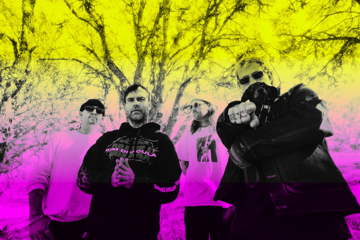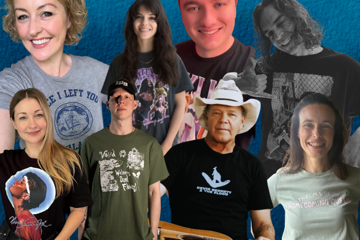In Session With Adalita
“I’m sticking to the original [demo] ideas very closely and being very focused and thorough with each part, just making sure I nail each part."
The very firm idea I had for this album,” singer, songwriter and guitarist Adalita Srsen, best known as the frontwoman of Melbourne indie rockers Magic Dirt, explains, three weeks into recording the follow-up to her eponymous 2011 solo debut, “was I wanted a band this time round. That's the main point of difference with this one – it's much louder and there's a lot more distorted guitar; a bit tougher than the last one.”
Adalita hadn't actually intended recording that debut solo album, being more than happy working within her band context, but Magic Dirt's bass player Dean Turner persuaded her to have a shot and the pair began working on it at Melbourne's Head Gap Studios. Sadly, Turner lost his battle with a rare form of tissue cancer in 2009, aged just 37, and Adalita finished off the album's production herself. So the desire to return to a band context with her second album is natural – and it's very much about getting the best out her guitar and pedal. “They've been my two lifelong companions, and I wanted to just get them recorded as authentically, with as much integrity as possible, and I wanted to bring out a lot of the nuances of the guitar playing, so I've got harmonics sort of stuff in there. And I just wanted a really nice, solid bedrock of guitar that goes with the drums, which is a really important part of the record as well. Just get the best, as always.”
Adalita plays a 2003 cherry red Gibson SG, with P94 pickups, through a Boss GS1 and a 40-watt Fender Hot Rod Deluxe amp (“I've actually gone to the other side for this record,” she chuckles) with the one 12” Eminence Legend 125 speaker. Alongside bass player Matt Bailey from The Paradise Motel, the rhythm section on the album features three drummers – Dirty Three's Jim White, who was back in Melbourne from New York, where he's based these days; The Devastations' Hugo Cran and Lee Parker, now Melbourne-based but formerly with Brisbane punk/hardcore bands Slug Guts and Teargas. Each was chosen for whatever their own unique playing style brought to a particular song, so it was important to record in a space that allowed for those different rhythmic and sonic nuances. That saw Adalita return to Melbourne's Birdland Studios.
Originally opening in 1992, Birdland features the country's only 128-input Neotek Elite console (64 channel including 12 stereo channels, which boosts it to 128), the console analogue automation modified to run from ProTools, with both ProTools and the console automation saved in the same ProTools session. Birdland boasts the country's only high-end Neotek Elite of this size, originally designed for use in a famous TV station abroad. Running the equivalent of HD6, Birdland's set-up is fitted with mastering quality Lynx converters, which out perform the standard Digidesign hardware. The studio reckons that, “Music with drums (rock, pop, indie etc) still sound better mixed through quality analogue consoles with great outboard, that's why the world's best still work that way.” Adalita adds that she loves that console: “It's spectacular, and it captures the sound perfectly and it's so rich and warm. I dunno – it's just got a really good vibe.”
Don't miss a beat with our FREE daily newsletter
As it turns out, though, Birdland wasn't Adalita's obvious choice. “It was at first,” she admits, “but then I went around and had a chat with some other producers because I wanted to spread my wings and fly with some new people, and had conversations with some great Australian producers who I admire, but then at the end I just felt like, because I was taking a big leap into the band sort of idea, I felt like I had so many new things going on that I probably needed something a bit more solid and familiar, and Birdland is one of my spiritual homes. So I went back to thinking of Birdland and [producer] Lindsay [Gravina]. He's perfect because he knows me and knows my sound and knows how to capture it, and he doesn't let me get away with anything, doesn't let me slack off – he's pushing me constantly to the edge. So I've got the familiarity with the world-class producer at my side, so we're coproducing together with Rob Long, the engineer, who's an absolute master in his field.”
Gravina of course had worked extensively with Adalita's band Magic Dirt, having engineered their 2004 What Are Rock Stars Doing Today album and recorded, coproduced and mastered their last, 2008's Girl. His production credits include Kate Miller-Heidke's 2012 Nightflight album, the late Rowland S Howard's last album, 2010's Pop Crimes, and Epicure's 2008 Postcards From A Ghost album, among many. Her familiarity with Gravina allowed her to take more risks while still feeling secure that her production team understood where she was coming from.
“I'm sticking to the original [demo] ideas very closely and being very focused and thorough with each part, just making sure I nail each part,” she explains, the recording process this time very different to her usual band experience. Leading up to the recording, she's jammed with each drummer, then rehearsed with the bass player, and has recorded each part separately rather together in a room in band mode. “It's been good concentrating on everything in blocks and the songs are being realised exactly how I want them to be.” As crucial as capturing the sound of her guitar and pedal with authenticity is of course that of Adalita's voice, and the studio has a Neumann M49 and a U87 on hand for just that purpose. No final decision yet on who will mix or master the album, but you can expect to hear the finished product before the year is over.







